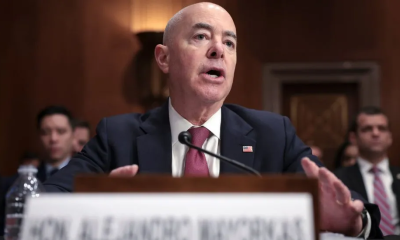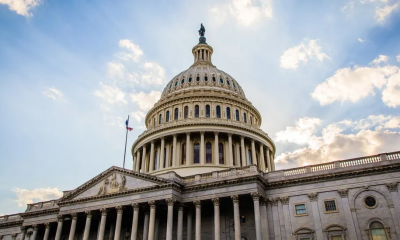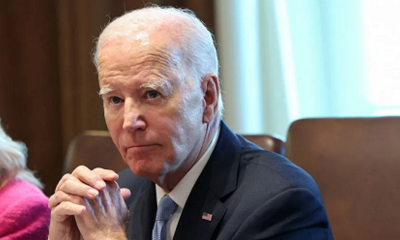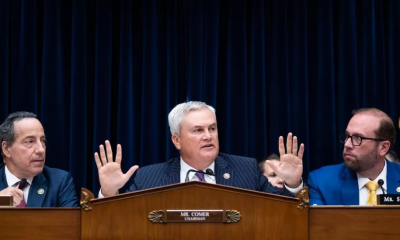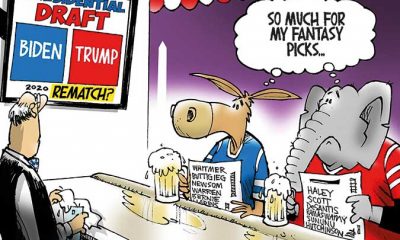Features
Western Discontents, India’s Long Election and Sri Lankan Anniversaries

by Rajan Philips
The attempted assassination of Slovakian Prime Minister Robert Fico has sent shivers down western spines. In a rare moment of unity, both Joe Biden and Vladimir Putin condemned the shooting. The identity of the arrested shooter has not been made public, but he is believed to be a 71 year old poet and writer violently protesting the Fico government’s attacks on media freedom including the replacement of Slovakia’s independent public broadcaster, RTVS, with a pro-government and ‘patriotic’ mouthpiece. The small country of five million that was born out of the 1993 dissolution of Czechoslovakia, in that famous “velvet divorce,” is now feared to be on the brink of more internal divisions and instability. And it has put Europe itself on edge.
There were forebodings at the time of the divorce about the trajectory that Slovakia would take unlike its severed twin, the Czech Republic, that was a model addition to the West. Then US Secretary of State Madeline Albright, a Czech American, called it “the black hole” of Europe. Now there is more of them and even within the old countries of Western Europe. Robert Fico has been Prime Minister twice before, between 2006 and 2010 and again from 2012 to 2018. After his defeat in 2018, he was pronounced politically dead, but he resurrected himself veering wildly from moderate left to extreme right, like so many other political leaders in Eastern Europe. The 59 year old Fico is a noted protégé of the Hungarian Prime Minister, Viktor Orban, who is notorious for his ideological contortions and right wing authoritarianism.
The Old Europe
The old Europe of consociational politics and electoral alternations between centre-left and centre-right political parties has virtually disappeared and the continent is now stuck in confrontations between the forces of extreme right and their new enemies, liberal elites. The old left has disappeared with the old Europe. In the continent, where Hegel first saw newspapers replacing morning Mass (now both have been replaced by the cell phone), freedom of expression and independent media are coming under threats from populist right wing governments.
Like Fico in Slovakia, Italy’s Prime Minister Giorgia Meloni is on course to allowing the sale of state-owned news agency AGI to a sitting lawmaker who already owns three conservative dailies and who belongs to the League Party that is a coalition partner of the Prime Minister’s Brothers of Italy party. Government supporters use the country’s draconian defamation laws to judicially harass and even jail prominent government critics. Philosophy Professor Donatella Di Cesare of Sapienza University in Rome has become the latest victim of defamation charges based on a complaint against her by Francesco Lollobrigida, brother-in-law of the Prime Minister and her Minister of Agriculture.
There are exceptions, as in Spain, where the Socialist Party is weathering opposition storm in Madrid and even won the largest share of the seats in the recent Catalonia regional election that saw, for the first time in over 10 years, the pro-independence parties collectively winning fewer seats than the other parties. In Britain, the Labour is all but assured of a rampaging return to power both at Westminster and in Holyrood, Edinburgh. But a catastrophic collapse of the Conservative Party may well trigger the rise of the extreme English right as a potent force in keeping up with its European Joneses, so to speak. Hopefully, what Tom Nairn called the ‘English enigma,’ to describe England’s historical indifference to nationalism, would not be fatally imperilled.
America is another story where seething social discontents are tearing apart the country’s, and the world’s oldest, democratic institutions. Adding insult to injury, Michael Johnson, the Republican Speaker of the House of Representatives, the third in the line of succession after the President and the Vice President, led a posse of Republicans and showed up last week in a Manhattan court room 200 km away from the capital, to show support to Donald Trump who is on trial in a criminal case involving his alleged hush-money payment to cover up his sexual dalliance with a porn star. The criminality is not about sex or even the payment, but about violating the election law and undermining election integrity by conspiring and suppressing negative information about himself from the public during the 2016 presidential election.
Of all the multiple indictments that Trump is facing, the porn star sex scandal is the least politically significant, but the only one that has been able to proceed to trial. All the other and far more serious indictments are mired in legal wrangling and judicial delays. The most heinous of them, Trump’s instigation of an insurrection in Washington on January 6, 2021, to overturn Biden’s election, is being held up at the Supreme Court until the Conservative Justices make up their mind about what one of them said would be “a ruling for the ages!” Hardcore Republicans believe that Trump is being unfairly subjected to politicized prosecution that they would expect to see only in third world countries. The Republicans who should know better, like Speaker Johnson, have jettisoned all political scruples and are supporting Trump to avoid falling foul of his rabid followers.
New India
In most third world countries, no political party would have someone like Trump as its presidential candidate. And against a candidate like Trump, an incumbent like Biden would not have to even campaign. But in America the race between them is close, thanks to the electoral college system that stymies the popular vote. Biden’s domestic record is exemplary – in restoring presidential stability after four years of Trump’s havoc; revamping the economy to becoming the only stable economy in the western world; and in implementing the largest slew of progressive and social welfare measures in 60 years – after Lyndon Johnson’s Great Society. Yet he is in a close race because of the social divisions that are frozen along party lines.
Biden’s Achilles heel is outside America. In Gaza and now potentially in Ukraine. Senator Bernie Sanders, a veteran of the 1968 antiwar protests and a progressive Democratic presidential contender in 2016 and 2020, has warned that Gaza could be Biden’s Vietnam, not because the two are comparable but because of their comparable political implications in an election year. As in 1968, when Nixon won the election promising peace in Vietnam.
In stopping arms shipment to Israel, Biden has gone farther than any President after Reagan. But that is not enough to stop pro-Palestinian student protesters in over 130 US campuses. Not enough either to mitigate US’s total isolation from the rest of the world on the Palestinian question. In The recent UN General Assembly vote to give Palestinians full membership status, received overwhelming support from 143 countries. The US was one of nine including Israel voting against the resolution.
Unlike western incumbent leaders, Prime Minister Modi has no problem about returning to power for a third term in India. The elections are now well past the halfway mark and the remaining contests are mostly in the northern states along with West Bengal and Maharashtra. Modi’s and the BJP’s problem is whether the BJP alliance will retain or exceed the 2019 tally of 353 seats (BJP alone got 303 seats). Modi started the election campaign with the call to get 400+ seats. The rhetoric has since been pegged back following indications of lower voter turnout compared to 2019. And the rhetoric has been switched to attack the Muslims to energize the subaltern Hindu vote in the Hindi belt areas that gave the BJP most of its seats in the last election.
What Modi has in common with many populist leaders in the west is in demonizing the elites and the secular and liberal traditions in politics. He targets the Congress elites of the past with studied vengeance. He is also aggressive in suppressing dissent and organizing media attacks, government investigations and defamation suits against those who oppose him. He has publicly boasted that the new India will reach out and kill its enemies even in their homes.
The statement is widely believed to be a reference to Modi government’s alleged attempts to silence Sikh activists involved in the Khalistan movement abroad. Notably so in the US and in Canada, where Indian emigrants with alleged connections to the Indian government are facing criminal indictments over murder and attempted murder charges. Prime Minister Modi could have won a third term without any of this, and India would still be a growing economic power by virtue of its population size and natural endowments. What role would the election results have in influencing the Modi government to rethink its ways is the question now. We have less than a month to find out.
Sri Lankan Anniversaries
Sri Lanka has a few months to go before its tryst with elections. Meanwhile, the month of May has two anniversaries that are three days apart. One marks the birth of the Republic of Sri Lanka and the adoption of the First Republican Constitution. Hence the First Republic, in Gaullist chronology. That was on May 22nd in 1972. The First Republic and its Constitution are widely believed to have been the principal cause of Tamil political alienation and the birth of Tamil separatism in Sri Lanka.
The state’s response over the next 10 to 15 years and the violent Tamil rejoinder led to many killings, a whole pogrom and a long drawn out war that pitted the Sri Lankan army against the LTTE. The war ended with the defeat of the LTTE on May 19, 2009. That is the second anniversary, and it marks an event that occurred 37 years after the First Republic was born and 31 years after it had been superseded by the Second Republic with its own Constitution in 1978.
There is no official or public commemoration of the May 22 anniversary that falls on Wednesday next week. The end of the war anniversary, on the other hand, is variously and even controversially commemorated on two different dates within Sri Lanka, and in the Tamil diaspora universe even involving foreign governments. The end of the war anniversaries have become the continuation of the war by peaceful means. One would hope that they remain peaceful forever and are not influenced or infected by the raw shenanigans such as allegedly involving the current Indian government and Khalistan Sikhs.
On the other hand, even though the anniversary of the First Republic and its Constitution is now unhonoured and unsung, the political changes and consequences that flowed from them have significant implications even today, 52 years later. One of those implications has been the never-ending preoccupation with constitutional politics. The 1972 Constitution carried in its womb the seeds of its own undoing and was totally repudiated and wholly replaced by a new constitution in 1978.
The 1978 Constitution introduced the executive presidential system that undermined the parliamentary system that was in force and put Sri Lanka on an uncharted constitutional path. Forty six years and 21 amendments later, the Sri Lankan Constitution is still a massive political bone of contention. How much of an issue would, or should, it be in the upcoming presidential election?
Features
The heart-friendly health minister

by Dr Gotabhya Ranasinghe
Senior Consultant Cardiologist
National Hospital Sri Lanka
When we sought a meeting with Hon Dr. Ramesh Pathirana, Minister of Health, he graciously cleared his busy schedule to accommodate us. Renowned for his attentive listening and deep understanding, Minister Pathirana is dedicated to advancing the health sector. His openness and transparency exemplify the qualities of an exemplary politician and minister.
Dr. Palitha Mahipala, the current Health Secretary, demonstrates both commendable enthusiasm and unwavering support. This combination of attributes makes him a highly compatible colleague for the esteemed Minister of Health.
Our discussion centered on a project that has been in the works for the past 30 years, one that no other minister had managed to advance.
Minister Pathirana, however, recognized the project’s significance and its potential to revolutionize care for heart patients.
The project involves the construction of a state-of-the-art facility at the premises of the National Hospital Colombo. The project’s location within the premises of the National Hospital underscores its importance and relevance to the healthcare infrastructure of the nation.
This facility will include a cardiology building and a tertiary care center, equipped with the latest technology to handle and treat all types of heart-related conditions and surgeries.
Securing funding was a major milestone for this initiative. Minister Pathirana successfully obtained approval for a $40 billion loan from the Asian Development Bank. With the funding in place, the foundation stone is scheduled to be laid in September this year, and construction will begin in January 2025.
This project guarantees a consistent and uninterrupted supply of stents and related medications for heart patients. As a result, patients will have timely access to essential medical supplies during their treatment and recovery. By securing these critical resources, the project aims to enhance patient outcomes, minimize treatment delays, and maintain the highest standards of cardiac care.
Upon its fruition, this monumental building will serve as a beacon of hope and healing, symbolizing the unwavering dedication to improving patient outcomes and fostering a healthier society.We anticipate a future marked by significant progress and positive outcomes in Sri Lanka’s cardiovascular treatment landscape within the foreseeable timeframe.
Features
A LOVING TRIBUTE TO JESUIT FR. ALOYSIUS PIERIS ON HIS 90th BIRTHDAY

by Fr. Emmanuel Fernando, OMI
Jesuit Fr. Aloysius Pieris (affectionately called Fr. Aloy) celebrated his 90th birthday on April 9, 2024 and I, as the editor of our Oblate Journal, THE MISSIONARY OBLATE had gone to press by that time. Immediately I decided to publish an article, appreciating the untiring selfless services he continues to offer for inter-Faith dialogue, the renewal of the Catholic Church, his concern for the poor and the suffering Sri Lankan masses and to me, the present writer.
It was in 1988, when I was appointed Director of the Oblate Scholastics at Ampitiya by the then Oblate Provincial Fr. Anselm Silva, that I came to know Fr. Aloy more closely. Knowing well his expertise in matters spiritual, theological, Indological and pastoral, and with the collaborative spirit of my companion-formators, our Oblate Scholastics were sent to Tulana, the Research and Encounter Centre, Kelaniya, of which he is the Founder-Director, for ‘exposure-programmes’ on matters spiritual, biblical, theological and pastoral. Some of these dimensions according to my view and that of my companion-formators, were not available at the National Seminary, Ampitiya.
Ever since that time, our Oblate formators/ accompaniers at the Oblate Scholasticate, Ampitiya , have continued to send our Oblate Scholastics to Tulana Centre for deepening their insights and convictions regarding matters needed to serve the people in today’s context. Fr. Aloy also had tried very enthusiastically with the Oblate team headed by Frs. Oswald Firth and Clement Waidyasekara to begin a Theologate, directed by the Religious Congregations in Sri Lanka, for the contextual formation/ accompaniment of their members. It should very well be a desired goal of the Leaders / Provincials of the Religious Congregations.
Besides being a formator/accompanier at the Oblate Scholasticate, I was entrusted also with the task of editing and publishing our Oblate journal, ‘The Missionary Oblate’. To maintain the quality of the journal I continue to depend on Fr. Aloy for his thought-provoking and stimulating articles on Biblical Spirituality, Biblical Theology and Ecclesiology. I am very grateful to him for his generous assistance. Of late, his writings on renewal of the Church, initiated by Pope St. John XX111 and continued by Pope Francis through the Synodal path, published in our Oblate journal, enable our readers to focus their attention also on the needed renewal in the Catholic Church in Sri Lanka. Fr. Aloy appreciated very much the Synodal path adopted by the Jesuit Pope Francis for the renewal of the Church, rooted very much on prayerful discernment. In my Religious and presbyteral life, Fr.Aloy continues to be my spiritual animator / guide and ongoing formator / acccompanier.
Fr. Aloysius Pieris, BA Hons (Lond), LPh (SHC, India), STL (PFT, Naples), PhD (SLU/VC), ThD (Tilburg), D.Ltt (KU), has been one of the eminent Asian theologians well recognized internationally and one who has lectured and held visiting chairs in many universities both in the West and in the East. Many members of Religious Congregations from Asian countries have benefited from his lectures and guidance in the East Asian Pastoral Institute (EAPI) in Manila, Philippines. He had been a Theologian consulted by the Federation of Asian Bishops’ Conferences for many years. During his professorship at the Gregorian University in Rome, he was called to be a member of a special group of advisers on other religions consulted by Pope Paul VI.
Fr. Aloy is the author of more than 30 books and well over 500 Research Papers. Some of his books and articles have been translated and published in several countries. Among those books, one can find the following: 1) The Genesis of an Asian Theology of Liberation (An Autobiographical Excursus on the Art of Theologising in Asia, 2) An Asian Theology of Liberation, 3) Providential Timeliness of Vatican 11 (a long-overdue halt to a scandalous millennium, 4) Give Vatican 11 a chance, 5) Leadership in the Church, 6) Relishing our faith in working for justice (Themes for study and discussion), 7) A Message meant mainly, not exclusively for Jesuits (Background information necessary for helping Francis renew the Church), 8) Lent in Lanka (Reflections and Resolutions, 9) Love meets wisdom (A Christian Experience of Buddhism, 10) Fire and Water 11) God’s Reign for God’s poor, 12) Our Unhiddden Agenda (How we Jesuits work, pray and form our men). He is also the Editor of two journals, Vagdevi, Journal of Religious Reflection and Dialogue, New Series.
Fr. Aloy has a BA in Pali and Sanskrit from the University of London and a Ph.D in Buddhist Philosophy from the University of Sri Lankan, Vidyodaya Campus. On Nov. 23, 2019, he was awarded the prestigious honorary Doctorate of Literature (D.Litt) by the Chancellor of the University of Kelaniya, the Most Venerable Welamitiyawe Dharmakirthi Sri Kusala Dhamma Thera.
Fr. Aloy continues to be a promoter of Gospel values and virtues. Justice as a constitutive dimension of love and social concern for the downtrodden masses are very much noted in his life and work. He had very much appreciated the commitment of the late Fr. Joseph (Joe) Fernando, the National Director of the Social and Economic Centre (SEDEC) for the poor.
In Sri Lanka, a few religious Congregations – the Good Shepherd Sisters, the Christian Brothers, the Marist Brothers and the Oblates – have invited him to animate their members especially during their Provincial Congresses, Chapters and International Conferences. The mainline Christian Churches also have sought his advice and followed his seminars. I, for one, regret very much, that the Sri Lankan authorities of the Catholic Church –today’s Hierarchy—- have not sought Fr.
Aloy’s expertise for the renewal of the Catholic Church in Sri Lanka and thus have not benefited from the immense store of wisdom and insight that he can offer to our local Church while the Sri Lankan bishops who governed the Catholic church in the immediate aftermath of the Second Vatican Council (Edmund Fernando OMI, Anthony de Saram, Leo Nanayakkara OSB, Frank Marcus Fernando, Paul Perera,) visited him and consulted him on many matters. Among the Tamil Bishops, Bishop Rayappu Joseph was keeping close contact with him and Bishop J. Deogupillai hosted him and his team visiting him after the horrible Black July massacre of Tamils.
Features
A fairy tale, success or debacle

Sri Lanka-Singapore Free Trade Agreement
By Gomi Senadhira
senadhiragomi@gmail.com
“You might tell fairy tales, but the progress of a country cannot be achieved through such narratives. A country cannot be developed by making false promises. The country moved backward because of the electoral promises made by political parties throughout time. We have witnessed that the ultimate result of this is the country becoming bankrupt. Unfortunately, many segments of the population have not come to realize this yet.” – President Ranil Wickremesinghe, 2024 Budget speech
Any Sri Lankan would agree with the above words of President Wickremesinghe on the false promises our politicians and officials make and the fairy tales they narrate which bankrupted this country. So, to understand this, let’s look at one such fairy tale with lots of false promises; Ranil Wickremesinghe’s greatest achievement in the area of international trade and investment promotion during the Yahapalana period, Sri Lanka-Singapore Free Trade Agreement (SLSFTA).
It is appropriate and timely to do it now as Finance Minister Wickremesinghe has just presented to parliament a bill on the National Policy on Economic Transformation which includes the establishment of an Office for International Trade and the Sri Lanka Institute of Economics and International Trade.
Was SLSFTA a “Cleverly negotiated Free Trade Agreement” as stated by the (former) Minister of Development Strategies and International Trade Malik Samarawickrama during the Parliamentary Debate on the SLSFTA in July 2018, or a colossal blunder covered up with lies, false promises, and fairy tales? After SLSFTA was signed there were a number of fairy tales published on this agreement by the Ministry of Development Strategies and International, Institute of Policy Studies, and others.
However, for this article, I would like to limit my comments to the speech by Minister Samarawickrama during the Parliamentary Debate, and the two most important areas in the agreement which were covered up with lies, fairy tales, and false promises, namely: revenue loss for Sri Lanka and Investment from Singapore. On the other important area, “Waste products dumping” I do not want to comment here as I have written extensively on the issue.
1. The revenue loss
During the Parliamentary Debate in July 2018, Minister Samarawickrama stated “…. let me reiterate that this FTA with Singapore has been very cleverly negotiated by us…. The liberalisation programme under this FTA has been carefully designed to have the least impact on domestic industry and revenue collection. We have included all revenue sensitive items in the negative list of items which will not be subject to removal of tariff. Therefore, 97.8% revenue from Customs duty is protected. Our tariff liberalisation will take place over a period of 12-15 years! In fact, the revenue earned through tariffs on goods imported from Singapore last year was Rs. 35 billion.
The revenue loss for over the next 15 years due to the FTA is only Rs. 733 million– which when annualised, on average, is just Rs. 51 million. That is just 0.14% per year! So anyone who claims the Singapore FTA causes revenue loss to the Government cannot do basic arithmetic! Mr. Speaker, in conclusion, I call on my fellow members of this House – don’t mislead the public with baseless criticism that is not grounded in facts. Don’t look at petty politics and use these issues for your own political survival.”
I was surprised to read the minister’s speech because an article published in January 2018 in “The Straits Times“, based on information released by the Singaporean Negotiators stated, “…. With the FTA, tariff savings for Singapore exports are estimated to hit $10 million annually“.
As the annual tariff savings (that is the revenue loss for Sri Lanka) calculated by the Singaporean Negotiators, Singaporean $ 10 million (Sri Lankan rupees 1,200 million in 2018) was way above the rupees’ 733 million revenue loss for 15 years estimated by the Sri Lankan negotiators, it was clear to any observer that one of the parties to the agreement had not done the basic arithmetic!
Six years later, according to a report published by “The Morning” newspaper, speaking at the Committee on Public Finance (COPF) on 7th May 2024, Mr Samarawickrama’s chief trade negotiator K.J. Weerasinghehad had admitted “…. that forecasted revenue loss for the Government of Sri Lanka through the Singapore FTA is Rs. 450 million in 2023 and Rs. 1.3 billion in 2024.”
If these numbers are correct, as tariff liberalisation under the SLSFTA has just started, we will pass Rs 2 billion very soon. Then, the question is how Sri Lanka’s trade negotiators made such a colossal blunder. Didn’t they do their basic arithmetic? If they didn’t know how to do basic arithmetic they should have at least done their basic readings. For example, the headline of the article published in The Straits Times in January 2018 was “Singapore, Sri Lanka sign FTA, annual savings of $10m expected”.
Anyway, as Sri Lanka’s chief negotiator reiterated at the COPF meeting that “…. since 99% of the tariffs in Singapore have zero rates of duty, Sri Lanka has agreed on 80% tariff liberalisation over a period of 15 years while expecting Singapore investments to address the imbalance in trade,” let’s turn towards investment.
Investment from Singapore
In July 2018, speaking during the Parliamentary Debate on the FTA this is what Minister Malik Samarawickrama stated on investment from Singapore, “Already, thanks to this FTA, in just the past two-and-a-half months since the agreement came into effect we have received a proposal from Singapore for investment amounting to $ 14.8 billion in an oil refinery for export of petroleum products. In addition, we have proposals for a steel manufacturing plant for exports ($ 1 billion investment), flour milling plant ($ 50 million), sugar refinery ($ 200 million). This adds up to more than $ 16.05 billion in the pipeline on these projects alone.
And all of these projects will create thousands of more jobs for our people. In principle approval has already been granted by the BOI and the investors are awaiting the release of land the environmental approvals to commence the project.
I request the Opposition and those with vested interests to change their narrow-minded thinking and join us to develop our country. We must always look at what is best for the whole community, not just the few who may oppose. We owe it to our people to courageously take decisions that will change their lives for the better.”
According to the media report I quoted earlier, speaking at the Committee on Public Finance (COPF) Chief Negotiator Weerasinghe has admitted that Sri Lanka was not happy with overall Singapore investments that have come in the past few years in return for the trade liberalisation under the Singapore-Sri Lanka Free Trade Agreement. He has added that between 2021 and 2023 the total investment from Singapore had been around $162 million!
What happened to those projects worth $16 billion negotiated, thanks to the SLSFTA, in just the two-and-a-half months after the agreement came into effect and approved by the BOI? I do not know about the steel manufacturing plant for exports ($ 1 billion investment), flour milling plant ($ 50 million) and sugar refinery ($ 200 million).
However, story of the multibillion-dollar investment in the Petroleum Refinery unfolded in a manner that would qualify it as the best fairy tale with false promises presented by our politicians and the officials, prior to 2019 elections.
Though many Sri Lankans got to know, through the media which repeatedly highlighted a plethora of issues surrounding the project and the questionable credentials of the Singaporean investor, the construction work on the Mirrijiwela Oil Refinery along with the cement factory began on the24th of March 2019 with a bang and Minister Ranil Wickremesinghe and his ministers along with the foreign and local dignitaries laid the foundation stones.
That was few months before the 2019 Presidential elections. Inaugurating the construction work Prime Minister Ranil Wickremesinghe said the projects will create thousands of job opportunities in the area and surrounding districts.
The oil refinery, which was to be built over 200 acres of land, with the capacity to refine 200,000 barrels of crude oil per day, was to generate US$7 billion of exports and create 1,500 direct and 3,000 indirect jobs. The construction of the refinery was to be completed in 44 months. Four years later, in August 2023 the Cabinet of Ministers approved the proposal presented by President Ranil Wickremesinghe to cancel the agreement with the investors of the refinery as the project has not been implemented! Can they explain to the country how much money was wasted to produce that fairy tale?
It is obvious that the President, ministers, and officials had made huge blunders and had deliberately misled the public and the parliament on the revenue loss and potential investment from SLSFTA with fairy tales and false promises.
As the president himself said, a country cannot be developed by making false promises or with fairy tales and these false promises and fairy tales had bankrupted the country. “Unfortunately, many segments of the population have not come to realize this yet”.
(The writer, a specialist and an activist on trade and development issues . )


